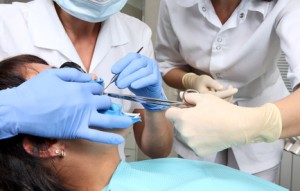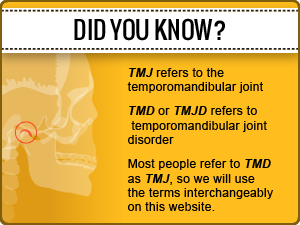Uneven Dentistry
What are the implications for TMJ?Uneven dentistry can cause TMJ
 Do you have recently completed dental work that is causing you problems when you eat? Does your bite feel unnatural or different than it did before you had that new crown placed? You may only be able to chew on one side of your mouth, or constantly be biting your cheek when you eat. You may also constantly feel like you are trying to grind your teeth back into a proper position. If you can relate to one or more of these questions, you may have some issues with your dental work. Unfortunately, having a misaligned bite because of uneven dentistry is not just uncomfortable, it can also cause TMJ.
Do you have recently completed dental work that is causing you problems when you eat? Does your bite feel unnatural or different than it did before you had that new crown placed? You may only be able to chew on one side of your mouth, or constantly be biting your cheek when you eat. You may also constantly feel like you are trying to grind your teeth back into a proper position. If you can relate to one or more of these questions, you may have some issues with your dental work. Unfortunately, having a misaligned bite because of uneven dentistry is not just uncomfortable, it can also cause TMJ.
Do I have TMJ Disorder?
Symptoms include migraines, neck pain, jaw pain, lower back pain, snoring, sleep apnea. Use our Free TMJ Disorder Assessment ToolsHow does uneven dentistry cause TMJ?
An uneven bite due to ill-fitting dental work creates problems similar to a misaligned bite. Specifically, the uneven biting action puts more stress on the TM joints, facial muscles, discs and ligaments. This is usually more noticeable on one particular side. The normal daily functions of chewing, talking, yawning, laughing or making other facial expressions causes fatigue to the entire jaw, facial and dental structure. If this problem is left to continue without repairing or correcting the dental fittings, additional symptoms may surface including:
- Tender teeth
- Tired and aching jaw
- Severe and chronic headaches or migraines
- Ear pain accompanied by ringing in the ears
- Difficulty closing teeth together
- Dizziness
- Clicking, popping or grating sounds in the jaw when chewing, talking or yawning
What are some examples of uneven dental work?
 Any type of ill-fitting dental work that changes the alignment of the natural bite can cause TMJ including:
Any type of ill-fitting dental work that changes the alignment of the natural bite can cause TMJ including:
- Improperly placed dental implants
- Crowns that are shaped too high or are not matched to the natural bite
- Uneven fillings
- Ill-fitting bridges or dentures
- It is even possible that TMJ is triggered from the addition of braces or other oral appliances
Evaluation and treatment:
Whether or not your dental work is a potential cause for your symptoms, and the result is a diagnosis of TMJ, we take the whole body, full picture approach. What this means is that we takes a detailed medical history to determine whether there are any prior events that might be a cause of your current condition. Additionally, we perform a thorough clinical examination to understand whether there are any physical or neurological conditions that may affect your jaw or bite alignment. At the completion of your examination, we will review all the findings and carefully explains them to you before determining the best course of treatment for your specific needs. This may include repairing or correcting your existing dental work or braces to ensure your teeth are in proper alignment.
We feel that best course of treatment is to first eliminate all or most pain before making irreversible dental changes. This two stage approach is utilized to protect the patients best interests.
Diagnostic tests may include the following:
- Examination of dental structure, including existing dental work
- Jaw position and range of motion
- Skeletal structure
- Other special x-rays and diagnostic tests, as required
Learn more
Download our free e-book today about how uneven dental work or braces may cause TMJ disorder. If this informational brochure leaves you with even more questions or a concern that you may have problems with your existing dental bridge, crown or implants, please contact our office to schedule your evaluation.


0 Comments